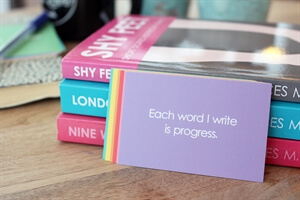NaNoWriMo Inspiration (Day 18): How podcasts help me write

Writing has brought about a number of interesting changes in my life but one of the stranger ones is that it has opened me up to the world of podcasts.
I should say re-opened me up to the world of podcasts but that sounds far too much like something went wrong post-surgery so I won't. Besides, the podcasts I used to listen to were predominantly made up of music and were part of the phenomenon that began when the iPod first came out (and isn't it interesting how the iPod was called that rather than iMusic!). At the time, maybe 10+ years ago, it was fantastic to find all this free music available online. All I had to do is click a button, plug in my iPod, let it all sync for a few minutes or hours depending on how binge-y I was feeling and then as long as I didn't prematurely eject the device, I could listen to those podcasts on the go. Simple?
Well, nowadays Spotify has rained on this kind of parade in a torrential way, but while I and others may have turned away from podcasting, the medium has only grown from strength to strength and is definitely enjoying something of a resurgence in popularity.
Writing re-introduced me to podcasting as I began to follow a number of shows by and targetted at fellow independent authors (namely - and in a loose order of my preference - Joanna Penn's podcast, the Self Publishing Podcast, the Rocking Self-Publishing Podcast and the Sell More Books Show). I've been following these shows for over two years and have found them incredibly useful and in many ways reassuring, not only because they share plenty of tried-and-tested experience but their business models are working.
Then, just last week, I began listening to Serial.
This is a podcast unlike any other I've listened to. It's a ten part investigative documentary of a team's re-opening (ew, that word again) of a murder case involving two teenagers, one the victim, Hae Min Lee, and one the convicted, Adnan Syed, who maintains his innocence. It's not clear how far in advance they record the episides but Thursday will see Episode 9 play out and the lead journalist/narrator Sarah Koenig has already admitted that it's possible the conclusion of Serial Season One may not be anymore conclusive than the to-ing and fro-ing back and forth between thinking he didn't do it, or even can't have done it, to just not being very certain of anything. One thing that does thankfully shine true is that the case against Syed was weak and flawed. In my mind highlighting this has been just as interesting and worthwhile as understanding more facts about the incident.
But what's been intriguing is that Serial has, on more than one occasion, held back information from the listener (and indeed I expect Episode 9 to reiterate this) and this reminded me of a recent - though by no stretch of the imagination new - trend of having an "unreliable narrator" (think Humbert in Lolita or Amy (and Nick) in Gone Girl). The reason this is done, of course, is to increase tension, to add a kick to the twist and to give the reader an experience that leaves them experiencing some of a variety of emotions; shock, anger, mistrust, uncertainty, disbelief, fear, discomfort... all of which are tantamount to a "thrill".
You may not think those emotions are ones easily enjoyed, and of course they're not by all people, but there's a reason "thriller" films, books and TV shows do so well. We like being made to feel something, even if it's not a "good" emotion. In order to achieve that "thrill" one must take the reader on a journey. Be it with an unreliable narrator, or be it with the most unbiased and trustworthy character you can imagine (like an investigative journalist with no personal attachment to a 15 year old case!?!), there has to be something before the "thrill" and there has to be something after. Of course, no story has to be limited to just one "thrill", and indeed the most successful thrillers rarely are.
I'm currently working on a fast-paced contemporary mystery. Except it doesn't really fit into the classic "detective fiction" genre. There's no murder, suspect or smoking gun. There's not even a policeman (though a couple of ex-coppers have been thrown in) and the crimes are mostly white-collar. So, it's not exactly crime and it's not exactly a thriller, because the story is more about one young woman than it is the mysteries she tries to solve. And she herself is a bit of a mystery....
(I'm being vague I know. But if you're keen to know more you can pick up London Eyes and flick through to An Invisible Girl as that's the first 9000 words of this book, right there.)
One of the reasons I have found writing the first draft for NaNoWriMo, despite over a month of careful planning, is that my need to rush through the key events and cover all the key ground that gives a mystery novel weight, has meant I have overlooked or rather I have actively ignored, how well I'm offering up these details to my readers... or not. Of course, this can all be reviewed and amended in the editing phase (and oh, boy is that going to be a job and a half) maybe I was too busy focusing on what I should be telling my readers, I wasn't thinking about what I shouldn't tell them.
Listening to Serial has taught me to be a bit more open-minded about this. I don't have to be clever. I don't have to shock and awe. I can just aim to take the reader on a journey and right now my job is to make sure we have a choice of roads to take, rather than the road that must be followed.
In fact, listening to Serial has taught me many things about storytelling. Many of them are already helping me write better this month. Here they are as they may help you too. Some are simple and some are more complex:
- Time spent enjoying somebody else's art/work is in itself inspiring. This doesn't have to be reading. Listen to Serial (or check out Criminal , another podcast I've been catching up with this month and learning lots). I think I'm enjoying crime and mystery related podcasts more because it's loosely connected to what I'm writing. You should therefore check out this list of other podcasts that may be more in line with what you're writing or interested in.
- A thrill is a journey, not a solitary emotion or feeling. You should focus on crafting a journey not a one-off sensation that won't stick unless it has context and conviction.
- The storyteller has a great power in choosing what to reveal, how to reveal it and when to reveal it. Those decisions will have to be made and unmade many times before they are in the right order.
- As is the case with podcasting, editors and other collaborators are essential to objectively make sure a story is the best possible version of itself. I don't know why we writers (myself included!) struggle to remember this.
- One of the most intriguing parts of Serial has been Sarah Koenig's personal journey. She has swayed from so many different view points and this is reflected in her voice as she shares findings and interviews with the listener. This reminded me of a quote from this article by James Altucher (who I'm not a massive fan of but he does have some worthy advice for writers) that "if it doesn't bleed, it doesn't lead". The writer should go on a journey of their own when they write a story. If they don't, how can they expect the reader to do the same.
I think that's enough scratching away at a podcast that has already received much more attention than I can give it. I still recommend you spend some time listening to it, even if it eats into your precious writing time. I am that confident you'll learn something about storytelling.
Then go back to your manuscript and continue your journey...
Only 12 more days to go. Bookmark this page for more NaNoWriMo Inspiration that will help you reach the finish line!

Frances M. Thompson
Find Frankie on Facebook, Twitter, Instagram, Pinterest, and Google+.
 Preptober Tips & 100 Preptober Prompts for NaNoWriMo Prep
Preptober Tips & 100 Preptober Prompts for NaNoWriMo Prep On Writing: The Only NaNoWriMo Tips You'll Ever Need
On Writing: The Only NaNoWriMo Tips You'll Ever Need On Writing: Ten Tips for NaNoWriMo
On Writing: Ten Tips for NaNoWriMo NaNoWriMo Inspiration (Day 30): Someday Soon All This Will Be Someone Else's Dream
NaNoWriMo Inspiration (Day 30): Someday Soon All This Will Be Someone Else's Dream NaNoWriMo Inspiration (Day 29): Ten Songs That Are Actually Novels in Disguise
NaNoWriMo Inspiration (Day 29): Ten Songs That Are Actually Novels in Disguise About the Blog & Frankie
About the Blog & Frankie Welcome to My Amsterdam Travel Blog!
Welcome to My Amsterdam Travel Blog! Welcome to My Luxury Family Travel Blog!
Welcome to My Luxury Family Travel Blog! Welcome to My Writing Blog!
Welcome to My Writing Blog! Lover Mother Other: Poems - Out Now!
Lover Mother Other: Poems - Out Now! I Write Stories That Move You
I Write Stories That Move You Order WriteNOW Cards - Affirmation Cards for Writers
Order WriteNOW Cards - Affirmation Cards for Writers Work With Me
Work With Me